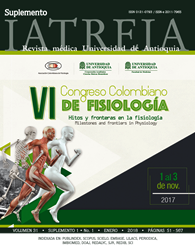Angiogenic roles of exosomal small non-coding RNAs in cervical and colon cancer
DOI:
https://doi.org/10.17533/udea.iatreia.330295Abstract
Cancer is a global health problem: 14 million new cases are diagnosed each year around the world. Approximately 70% of deaths from cancer occur in low- and middle-income countries. In Colombia, cervical cancer (ceCA) and colorectal cancer (CRC) are the second and fifth causes of cancer deaths. Notably, ceCA survivors are at higher risk to develop CRC due to mechanisms still not fully understood. The angiogenic switch (the transition from a pre-vascular to a vascularized tumor phenotype) is one important mechanism, necessary for invasive tumor growth and metastasis, and implied in this phenomenon. Tumor cells establish a favorable environment for angiogenic switch by secreting several factors including miRNAs packaged in exosomes (exo-miRs), small vesicles derived from endosomes. Those exo-miRs can downregulate the expression of PTEN gene, an angiogenesis inhibitor which regulates negatively the pro-angiogenic expression and signaling of Vascular Endothelial Growth Factor (VEGF) and Endothelin 1 (ET-1). Thus exo-miRs have a role in angiogenesis, especially during the low vascularized phase of in situ carcinoma, and consequently exo-miR signaling represent an important and scarcely studied mechanism of cell-cell communication with potential to reveal new targets of therapeutic administration. During the meeting we will propose a study to identify mechanisms of exo-miRs to induce angiogenesis: the current methods for this kind of study, identification of miRNAs population in exosomes, their effects on specific genes in target cells, as well as alterations in physiological responses such as angiogenesis.
Downloads
Downloads
Published
How to Cite
Issue
Section
License
Papers published in the journal are available for use under the Creative Commons license, specifically Attribution-NonCommercial-ShareAlike 4.0 International.
The papers must be unpublished and sent exclusively to the Journal Iatreia; the author uploading the contribution is required to submit two fully completed formats: article submission and authorship responsibility.














